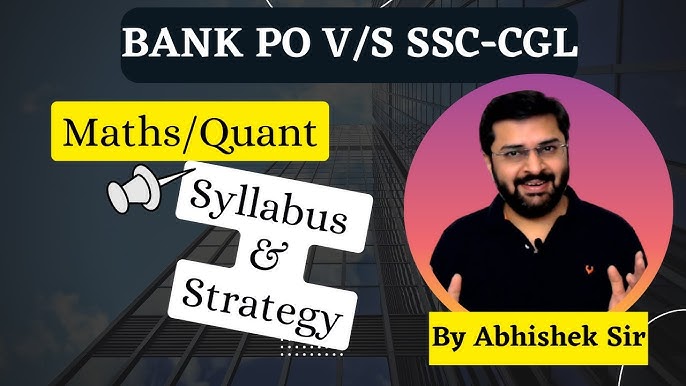
For students and job seekers aiming for government or banking jobs in India, the Staff Selection Commission Combined Graduate Level (SSC CGL) exam and various Bank Exams (such as IBPS PO, SBI PO, or Clerk exams) are two of the most sought-after competitive exams. Both offer stable and rewarding career options, but they cater to different job roles and have unique selection processes. If you’re wondering which path is better suited to your skills and goals, understanding the key differences between these exams is essential.
Nature of Jobs
SSC CGL
The SSC CGL exam recruits candidates for various Group B and Group C posts in central government departments and ministries. Common job roles include:
- Income Tax Inspector
- Assistant Section Officer (ASO)
- Auditor in CAG
- Preventive Officer in Customs
- Statistical Investigator
These roles involve administrative, clerical, or inspection duties in government offices, with a primary focus on public service and governance.
Bank Exams
Bank exams recruit candidates for roles in public sector banks, such as:
- Probationary Officer (PO)
- Clerk/Assistant
- Specialist Officer (SO)
Bank jobs focus on customer service, financial operations, and business development. Tasks include account management, loan processing, and handling day-to-day banking operations.
Exam Conducting Authorities
- SSC CGL: Conducted by the Staff Selection Commission (SSC), a government body responsible for recruiting staff for central government positions.
- Bank Exams: Conducted by organizations like the Institute of Banking Personnel Selection (IBPS) and individual banks like the State Bank of India (SBI).
Selection Process
SSC CGL
The SSC CGL selection process typically consists of:
- Tier-I: Preliminary exam (Objective, General Awareness, Reasoning, Quantitative Aptitude, English).
- Tier-II: Mains exam (Quantitative Abilities, English Language, Statistics, General Studies).
- Tier-III: Descriptive test (Essay/Letter writing).
- Tier-IV: Skill Test (DEST/CPT) or Document Verification (depending on the post).
Bank Exams
The selection process for bank exams generally includes:
- Preliminary Exam: Covers Reasoning, Quantitative Aptitude, and English.
- Mains Exam: Includes advanced reasoning, quantitative aptitude, general awareness (with a focus on banking), and computer knowledge.
- Interview/Group Discussion: For PO and SO roles. Clerical posts typically do not have an interview round.
Exam Syllabus
While both exams test reasoning, quantitative aptitude, and English, their focus areas differ:
- SSC CGL: Includes sections on General Awareness and topics related to government policies, history, geography, and economics. It also emphasizes advanced mathematics and statistical analysis for certain posts.
- Bank Exams: Have a stronger focus on current affairs, banking awareness, and computer knowledge, along with numerical ability and data interpretation.
Difficulty Level
- SSC CGL: Requires in-depth preparation, especially in advanced mathematics and general studies. The competition is high due to the wide range of posts offered.
- Bank Exams: Focus more on speed and accuracy, given the time constraints in prelims and mains. Reasoning and data interpretation sections are often more challenging in bank exams compared to SSC CGL.
Work Environment
SSC CGL
- Office-based jobs with fixed working hours (generally 9 to 5).
- Minimal public interaction.
- Opportunities for fieldwork (depending on the role).
- Job transfers can occur across India but are less frequent compared to bank jobs.
Bank Jobs
- Customer-facing roles with dynamic work environments.
- Work hours may extend beyond regular office timings, especially during peak seasons.
- Faster transfers, especially in the probation period.
- A focus on achieving business targets and meeting deadlines.
Growth Opportunities
SSC CGL
- Career progression depends on departmental promotions, which are typically time-bound and based on seniority.
- Opportunities to move to higher administrative roles like Under Secretary or Director in central government ministries.
Bank Jobs
- Faster growth opportunities through internal exams and merit-based promotions.
- Possibility of moving up to senior management roles such as Branch Manager, Regional Manager, or even General Manager.
Salary and Benefits
SSC CGL
- Starting salary depends on the post but typically ranges between ₹25,000 to ₹55,000 per month (excluding allowances).
- Additional perks include government quarters, medical benefits, and pension schemes.
Bank Jobs
- Probationary Officers earn around ₹35,000 to ₹60,000 per month (including allowances).
- Benefits include housing allowances, medical insurance, and performance-based bonuses. However, bank employees are part of the NPS (New Pension Scheme), unlike the old pension system for SSC roles.
Job Security
- SSC CGL: Central government jobs offer unmatched job security and stability.
- Bank Exams: While public sector bank jobs are also secure, they may face occasional restructuring due to privatization trends.
Work-Life Balance
- SSC CGL: Generally provides a better work-life balance due to fixed hours and less pressure.
- Bank Jobs: Can be more demanding, with extended work hours, especially for roles like PO, which involve target-based responsibilities.
Which One Should You Choose?
Your choice between SSC CGL and bank exams depends on your career aspirations, skills, and preferences:
- Opt for SSC CGL if you seek administrative roles, a stable work-life balance, and are interested in contributing to governance and public service.
- Choose Bank Exams if you prefer customer-facing roles, dynamic growth opportunities, and are comfortable with a fast-paced, target-driven work environment.
Both paths offer promising career opportunities. Your decision should align with your long-term goals, work preferences, and areas of interest.







